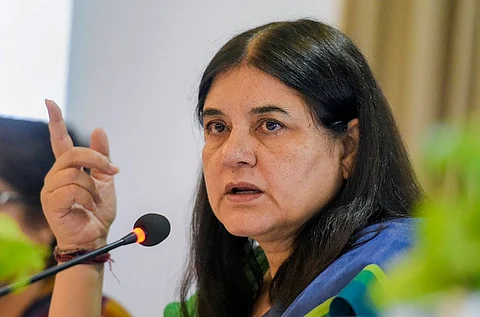

Two days ago, a shameful scene unfolded in the Parliament of India, which is currently in its monsoon session. Women and Child Development Minister, while discussing the Trafficking of Persons (Prevention, Protection and Rehabilitation) Bill 2018, not only displayed insensitivity towards the transgender community, but also laughed while at it.
The minister, while referring to MP Shashi Tharoor’s concerns about harassment of sex workers who were in the profession voluntarily, said, “The Bill focusses on a victim. If a voluntary sex worker is not a victim, has not been trafficked, has no one to blame for his or her or…” and here, she suddenly smiles cheekily, and continues, “the other ones!”
Immediately, she sniggers and rolls her eyes, to the apparent amusement of the MPs sitting behind her as well.
“Ya ok, the ‘TGs’ problems,” Maneka finishes the sentence.
The uncomfortable giggling and sniggering – very much like a 6th standard classroom during a biology lesson on reproduction, and very little like the Parliament of India – happened even as the Minister of Women and Child Development spoke about the reality of police harassment faced by transgender women.
A portion of the video of Maneka’s Lok Sabha speech was shared on social media platforms by Meera Sanghamitra, a member of the National Alliance for People’s Movements and a trans woman.
Slamming the minister, Meera said that transgender persons are not “the other ones”, but equal citizens. She demanded that the minister also apologise to the entire trans community for making this derogatory and insensitive statement.
. @Manekagandhibjp We are #NotOtherOnes or your pets. We are equally human, equal citizens. APOLOGIZE to the entire transgender community NOW, for your extremely derogatory, insenstive reference and gesture. This does not behove a Cabinet Minister! Appalled, Anguished, Ashamed ! pic.twitter.com/v9uPwm8VEj
— Meera Sanghamitra (@meeracomposes) July 27, 2018
The Bill was passed by the Lok Sabha, despite reservations expressed by sex workers, the trans community and human rights activists.
Othering the trans community reinforces stereotypes
Speaking to TNM, both Meera and Grace Banu, a transgender rights activist, say that Maneka’s flippant attitude towards othering the trans community was reflective of the society’s attitude towards them.
“It’s sad because politicians have the power to make a difference. Instead, they continue to remain ignorant and transphobic,” Grace says. “This reflects in their laws and policy decisions too. The community has been demanding reservation in education as well as employment, but those in power are reluctant to even discuss it,” she explains.
Meera adds that Maneka’s statements are particularly callous because they come at a precarious time when the trans community is trying very hard to mobilise and break stereotypes. Being dehumanised and othered are issues that many transgender persons face on a day to day basis.
“She has just reinforced and legitimised the same stereotypes with her attitude and statement. The only saving grace that day in the Parliament was NCP leader Supriya Sule calling her out on her othering the our community,” Meera says.
‘The Anti-Trafficking Bill is a setback for trans community’
Over the last few weeks, there have been a number of reports where stakeholders such as sex workers and transgender persons have expressed their reservations with the Anti-Trafficking Bill in its present form.
Grace and Meera highlight the issues of the Bill that are a setback to the trans community.
For starters, the Bill does not make a distinction between those trafficked into sex work, and consenting sex workers.
“The latter category has both cis women and trans women. Cis women still have others forms of livelihood available to them. But to invisibalise consenting sex workers altogether is taking away one of the major sources of livelihood of the transgender community,” Meera explains.
“What is needed is recognition of sex work as a form of labour and to provide protection to consenting sex workers under the law. But that has not been done,” she adds.
Another major problem with the Bill is that under Section 31(iv), “administering any chemical substance or hormones on a person for the purpose of early sexual maturity” is illegal. This makes a trans person undergoing hormone therapy to transition, a criminal.
Meera says that this makes things even tougher for a transgender person who has taken the difficult decision to transition in the first place. “We don’t have access to proper healthcare services or guidance. People have been forced to move cities, just because they haven’t found a non-transphobic endocrinologist.”
“This is an extremely transphobic facet of the Bill,” Grace argues.
‘Withdraw remarks against sex workers and trans community’
On Sunday, a number of trans persons, activists, queer and feminist organisations, journalists, lawyers and other allies, wrote a memorandum to Maneka Gandhi, demanding an apology for her remarks in the Parliament. Many of them had come together under the banner of Coalition on an Inclusive Approach to the Trafficking Bill, to ensure that the Anti-Trafficking Bill did not criminalise and further stigmatise the vulnerable communities it purports to save and rehabilitate.
“We trust that you will formally withdraw your unparliamentary and crude remarks about women and transgender individuals, and in the interests of democracy and justice take on board the concerns we have expressed such that the rights and dignity of adult sex workers, transgender persons, migrant workers, beggars and other vulnerable communities impacted by the Bill will be protected and restored,” the signers of the memorandum demand.